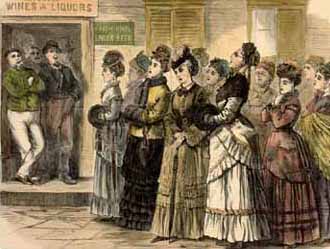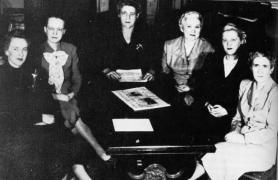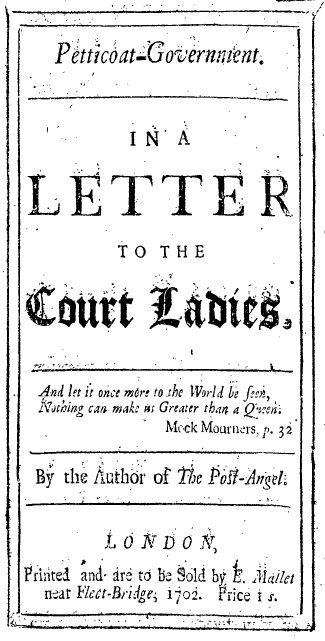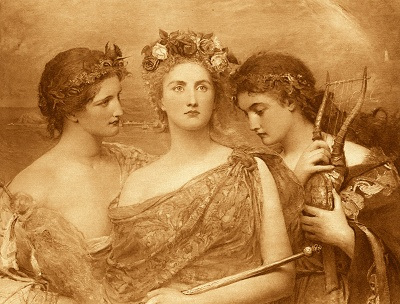The following excerpts from Max O’Rell’s 1896 article Petticoat Government treat of women’s domination in home and society in the United States of America. The article shows women’s influence over both culture and government legislation via political activism – PW
The women of good society in America are what they are everywhere else, satisfied with their lot which consists in being the adored goddesses of refined households; but there exists in this country, among the middle (or in European parlance, lower-middle) classes restless, bumptious, ever poking-their-noses-everywhere women who are slowly, but surely and safely, transforming this great land of liberty into a land of petty, fussy tyranny, and trying, often with complete success, to impose on the community fads of every shape and form.
If there is one country in the world where the women appear, in the eyes of the foreign visitor, to enjoy all manner of privileges and to have the men in leading strings, that country is America. You would imagine, therefore, that America should be the last country where the “new woman” was to be found airing her grievances. Yet she is flourishing throughout the length and breadth of this huge continent. She is petted by her husband, the most devoted and hard-working of husbands in the world; she is literally covered with precious stones by him. She is allowed to wear hats that would “fetch” Paris in Carnival time, or start a panic at a Corpus-Christi procession in Paris or a Lord-Mayor’s Show in London. She is the superior of her husband in education, and almost in every respect. She is surrounded by the most numerous and delicate attentions. Yet she is not satisfied.
The Anglo-Saxon “new woman” is the most ridiculous production of modern times and destined to be the most ghastly failure of the century. She is par excellence the woman with a grievance, and self-labelled the greatest nuisance of modern society. The new woman wants to retain all the privileges of her sex and secure, besides, all those of man. She wants to be a man and to remain a woman. She will fail to become a man, but she may succeed in ceasing to be a woman.
Teetotaler Politics
I think that of all the grand fads indulged in by some women in America the palm should be given to the compulsory water-drinking work. That is a colossal illustration of what women can do when left entirely to their own resources.
Now, I will lay down as a sort of principle that the “temperance” woman and the teetotaler are not to be found in refined society, and I don’t think that in saying so, I shall run the risk of being contradicted. I have often been a guest at the Union Club, the Union League Club, the Manhattan, the Century, the Players, and many other good clubs, I have dined in the best houses of the great American cities, and nowhere have I met teetotalers in those circles of society. Refined, intelligent people of good society, artists, literary men are not teetotalers; that will be granted by everybody. I don’t mention politicians, even of the best class, who have at times to be teetotalers to catch votes in a democracy.
The smaller towns of America – and that is America proper – are ruled by fussy, interfering faddists, fanatics of all sorts, old women of both sexes, shrieking cockatoos that will by-and-by make life well-nigh intolerable to any man of self-respect and make him wonder whether he lives in a free country or not.
The Mayor’s Wife
Take two lively illustrations. A few months ago I was in the town of E. (Kansas). There was a mayor who was married, and the happy pair had a little boy. That little boy was a wicked little boy. One day he was caught smoking a cigarette. Now what should be done by sensible parents to such a wicked little boy? Why, he should be turned over and given a good hearty – you know! This is not at all what was done. The mayor’s wife called up a meeting of women, made a violent speech on the pernicious habit of cigarette smoking, and it was decided to petition the mayor and ask him to forbid the sale of cigarettes within the precincts of his jurisdiction. For the sake of peace and happiness at home, the worthy mayor published an edict prohibiting the sale of cigarettes in his district. However, cigarettes can be had in the town of E., but you have to walk nearly a mile, just outside the limits of the mayor’s jurisdiction, to find a store where a roaring trade in cigarettes is done. All the same, you must admit that it is a nuisance to be obliged to walk a mile, in a free country, to buy a little article of luxury that you indulge in, without ever abusing it, because there happens to be in the town a wicked little boy that once smoked a cigarette.
Women’s Temperance Society Activism
When I was in the town of T. (Arkansas), only a few weeks ago, I gave a lecture under the auspices of “temperance” ladies of the city. They called on me.
Being of a rather inquisitive turn of mind, I said to them: “Now, ladies, I understand I am in a prohibition State. How do you account for your existence? Do you wish now to advocate the suppression of tea, coffee and icewater, which, I must say, would go a long way toward improving the complexion and the digestive apparatus of your fellow-creatures?”
“No,” they said; “we find that, in spite of the law, there is liquor, wine and beer still sold in this town, and we want to put a stop to it.”
 I knew that such was the case, for I had, proh pudor! a bottle of lager beer in my pocket which I had bought for my dinner, but which, I am glad to say, was not discovered by the ladies under the auspices of whom I was to lecture in the evening. I can do with ice-water, but in a prohibition State I cannot. The evil spirit prompts me. I must have beer or wine with my meals. I have never been drunk in my life; but if I ever get drunk, it will be in a prohibition State.
I knew that such was the case, for I had, proh pudor! a bottle of lager beer in my pocket which I had bought for my dinner, but which, I am glad to say, was not discovered by the ladies under the auspices of whom I was to lecture in the evening. I can do with ice-water, but in a prohibition State I cannot. The evil spirit prompts me. I must have beer or wine with my meals. I have never been drunk in my life; but if I ever get drunk, it will be in a prohibition State.
“Well,” said the lady president of the temperance society of the town of T., “could you believe that, a few days ago, a poor woman of the town and her children actually died of starvation, while every day her husband got drunk with the wages he received?”
“But,” I mildly suggested, “you should see that that man was punished, not the innocent population of this town. Don’t suppress the wine, which is a gift of God: punish – suppress, even, if you like – the drunkard. It is not wine that makes a man drunk, it is vice. Don’t suppress the wine, suppress the vice, or the vicious. Imprison a drunkard, lynch him, hang, shoot him, quarter him, do what you like with him, but allow hundreds of good, wise, temperate people, who would use wine in moderation, to indulge in a habit that makes men moderate, cheerful and happy.”
My argument was lost on them.
Every year there are men who use knives to stab fellow-creatures; but there are millions who use their knives to eat their meals peacefully with. The law punishes the criminals, but would not think of suppressing the knives.
Any law is bad that punishes, injures, or annoys thousands of good, innocent people in order to stop the mischief done by a few – a very few, after all – blackguards and scoundrels.
These Christian ladies left me certainly unconverted, and took their revenge by not paying me my fee after the lecture, which confirmed me in my firm resolution never to have anything to do with angels – this side of the grave.
The Anglo-Saxon should by all means preach temperance, which means moderation, not total abstinence. What they preach overreaches the mark and does no good. When you say that a country enjoys a temperate climate, that does not mean that it has no climate at all, but enjoys a moderate one, neither too hot nor too cold.
These same Anglo-Saxons should not despise, but admire and envy, those who can enjoy, like men of understanding, like gentlemen, the glorious gifts of God to man without ever making fools of themselves. For these, the law should be made.
If your husband or son, dear lady, would like to have a glass of wine or beer with his dinner, let him have it in your sweet and wholesome presence. Don’t make a hypocrite of him. Don’t compel him to go and hide himself in his club or, worse, in a saloon, or, worse still, don’t allow him to go and lose his manhood’s dignity by crawling on all fours under the counter of a drug-store.
There is no virtue in compulsion. There is virtue only in liberty.
Ah! how I remember admiring, in the hot days of blue-ribbonism in England, that free Briton I once met who had a yellow ribbon in his button hole.
“That’s a yellow ribbon,” he replied. “I belong to the yellow ribbon army.”
“Ah, and what is it the yellow-ribbon army do?” I inquired.
“What do we do?” he said, “Why, we eat what we likes, we drink what we likes and we don’t care a — for nobody.”
There are well-meaning, most highly estimable and talented ladies who go about the world preaching temperance, that is to say, total abstinence, not moderation.
Now, as a rule, these ladies have special reasons for so doing. Very often they have led a life of sorrow and misery with wretched husbands, and they should be pitied. But hundreds of thousands of women have good husbands who have not to be cured of habits which they never in their lives indulged in, and who would be condemned to deny themselves every little luxury that helps make life cheerful when used with moderation and discretion, if the preachings of these often unfortunate ladies were to take the shape of laws.
I have often had to listen to self-confessed, reformed drunkards who preached to me who never was once drunk in my life. The thing is ludicrous.
There exist, among the Anglo-Saxons, people to whom the strains of Wagner and Beethoven’s music say absolutely nothing, to whom the Venus of Milo is indecent. They declare music and the fine arts immoral, and if they had their way, they would close the concert halls and the museums on every day of the week. Because their minds are distorted, foul and even dirty, they would condemn people with lofty and artistic minds to never hear a masterpiece of music or behold a masterpiece of painting or statuary. I have met people who declared they would never again set foot inside the walls of the Louvre and of the British Museum. And if the Anglo-Saxon fanatics, those arch enemies of art, make a little more progress, the future of that great Institution, the British Institution, is not safe.
As everybody knows, there exist, in Great Britain and in America, thousands of people who declare the stage to be a most wicked and immoral institution. I have on the subject a rather pleasant reminiscence which illustrates how the Anglo-Saxons can combine the spirit of morality with the spirit of business. I once gave a lecture, in a town of some twenty thousand inhabitants in the State of Kansas, under the auspices of a society of lady reformers. They had engaged the Opera House for the occasion. I arrived at the theatre a few minutes after eight. The ladies in charge were in the ticket-office pocketing money as fast as they could. To my great gratification there was an immense house, which was due, no doubt, far more to the popularity of the ladies’ philanthropic cause than to my own modest personality. When the crowd was in and seated, I asked to be led to the stage, and I said to the lady president of the society: “I suppose you have your seats reserved.” “No,” she replied, “I have not. I don’t think I will go in, if you will excuse me. I am proud to say that I have never once in my life set foot inside a theatre.” I literally collapsed. There were in that theatre some twelve hundred people whom these good ladies had induced to “sin” to fill the coffers of their society.
All these movements, headed by women, are in the wrong direction. They interfere with the liberties of a great people, and punish thousands and thousands of good, orderly, well-behaved people, to reach a score or two of bad ones, whom they often fail to reach and of tener still fail to cure. I repeat it, there are many hundreds of good people in this world for a very few hundreds of bad ones. The laws should aim at reaching the former and protecting them. This world is considerably better than the fanatics of all denominations and superstitions would make us believe. For eleven years, I have travelled all over the world, and I have never met any but honorable people to deal with. For instance, I have given 1,272 lectures in my life, and only once dil I come across a man who behaved dishonestly toward me. He ran away with the cash while I was speaking.
Yes, the world is good, very good, in spite of the calumnies that are constantly hurled at its face by the Pharisees of Anglo-Saxondom. Yes, full of good men, crammed with good women, and the excellent ladies of the Philanthropic societies of America should take it for granted that there are many, many good and virtuous people besides themselves.
You don’t cut down an apple tree because there are two or three bad apples on it. You cut down the two or three bad apples, and all your efforts tend to see that the hundreds of good ones are made healthy, happy, and comfortable.
Max O’Rell


























You must be logged in to post a comment.